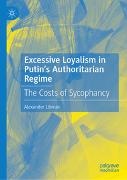Share
Fr. 158.00
Alexander Libman
Excessive Loyalism in Putin’s Authoritarian Regime - The Costs of Sycophancy
English · Hardback
Will be released 30.09.2025
Description
This book provides new insights into how excessive loyalism hinders Russia’s authoritarian government. When Russian bureaucrats, diplomats and academics go to great lengths to display their loyalty to the regime in Moscow, many observers regard it as a show of regime’s strength. Yet where this results in overcompliance, excessive praise or needlessly aggressive rhetoric, it becomes a source of weakness – not only alienating citizens at home and irritating allies abroad but even contributing to costly strategic mistakes, such as Russia’s full-scale invasion of Ukraine.
The book engages with an intractable dilemma facing the regime: it cannot punish these actors for being too loyal, but it also cannot allow such expressions of loyalty to break the boundaries it sets. The author helps explain why the regime has repeatedly stunned the international community with unexpected political moves and, in several cases, become its own worst enemy. In doing so, he illuminates many of the dynamics through which sycophancy undermines authoritarian governments across the world. The book addresses a broad array of manifestations of excessive loyalism and sycophancy in Russia – from rude and offensive comments of bureaucrats to rhetorical dissonance in the foreign policy to politically motivated rhetoric in the Russian academia. It combines quantitative and qualitative tools to study sycophancy empirically and develops a theory of excessive loyalism, which is applicable well beyond the Russian case.
Alexander Libman is Professor of Russian and East European Politics at the Freie Universität Berlin, Germany. His main research interests include comparative politics of authoritarian regimes, Russian politics, historical legacies of authoritarianism and authoritarian cooperation in the post-Soviet Eurasia. His work has been published, among others, in the American Political Science Review, Comparative Political Studies, World Politics, Perspectives on Politics and British Journal of Political Science.
List of contents
Chapter 1: Introduction.- Chapter 2: Political control in an authoritarian regime.- Chapter 3: Excessive loyalism and its consequences.- Chapter 4: Identifying excessive loyalism in empirical settings.- Chapter 5: Russian authoritarianism: A brief sketch.- Chapter 6: Excessive loyalism in the domestic and foreign policy rhetoric.- Chapter 7: Eurasian regionalism and excessive loyalism.- Chapter 8: Triggers of excessive loyalism: pension reform and other cases.- Chapter 9: Excessive loyalism and society: Russian academic community.- Chapter 10: Sycophancy and regime’s policy.- Chapter 11: Conclusion.
About the author
Alexander Libman is Professor of Russian and East European Politics at the Freie Universität Berlin, Germany. His main research interests include comparative politics of authoritarian regimes, Russian politics, historical legacies of authoritarianism and authoritarian cooperation in the post-Soviet Eurasia. His work has been published, among others, in the American Political Science Review, Comparative Political Studies, World Politics, Perspectives on Politics and British Journal of Political Science.
Summary
This book provides new insights into how excessive loyalism hinders Russia’s authoritarian government. When Russian bureaucrats, diplomats and academics go to great lengths to display their loyalty to the regime in Moscow, many observers regard it as a show of regime’s strength. Yet where this results in overcompliance, excessive praise or needlessly aggressive rhetoric, it becomes a source of weakness – not only alienating citizens at home and irritating allies abroad but even contributing to costly strategic mistakes, such as Russia’s full-scale invasion of Ukraine.
The book engages with an intractable dilemma facing the regime: it cannot punish these actors for being too loyal, but it also cannot allow such expressions of loyalty to break the boundaries it sets. The author helps explain why the regime has repeatedly stunned the international community with unexpected political moves and, in several cases, become its own worst enemy. In doing so, he illuminates many of the dynamics through which sycophancy undermines authoritarian governments across the world. The book addresses a broad array of manifestations of excessive loyalism and sycophancy in Russia – from rude and offensive comments of bureaucrats to rhetorical dissonance in the foreign policy to politically motivated rhetoric in the Russian academia. It combines quantitative and qualitative tools to study sycophancy empirically and develops a theory of excessive loyalism, which is applicable well beyond the Russian case.
Alexander Libman is Professor of Russian and East European Politics at the Freie Universität Berlin, Germany. His main research interests include comparative politics of authoritarian regimes, Russian politics, historical legacies of authoritarianism and authoritarian cooperation in the post-Soviet Eurasia. His work has been published, among others, in the American Political Science Review, Comparative Political Studies, World Politics, Perspectives on Politics and British Journal of Political Science.
Product details
| Authors | Alexander Libman |
| Publisher | Springer International Publishing |
| Languages | English |
| Product format | Hardback |
| Release | 30.09.2025 |
| EAN | 9783032012678 |
| ISBN | 978-3-032-01267-8 |
| No. of pages | 254 |
| Illustrations | X, 254 p. |
| Subjects |
Social sciences, law, business
> Political science
> Political system
Internationale Beziehungen, Europa, European Politics, Politische Führer und Führung, Vladimir Putin, foreign policy, auseinandersetzen, Bureaucracy, Authoritarianism, Political Leadership, political rhetoric, Russian politics |
Customer reviews
No reviews have been written for this item yet. Write the first review and be helpful to other users when they decide on a purchase.
Write a review
Thumbs up or thumbs down? Write your own review.

